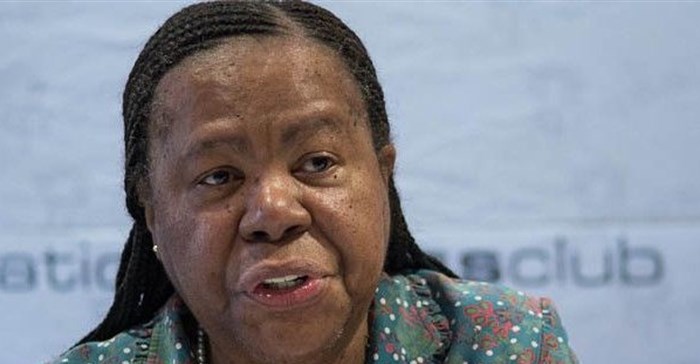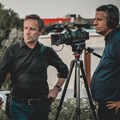The Minister of International Relations and Cooperation, Dr Naledi Pandor has cleared the air over a clash in policy with South African President Cyril Ramaphosa.

Source: Flickr
The two were reported to have differed over South Africa's stance on Russia's invasion of the Ukraine.
Minister Pandor just days earlier said Russia should unequivocally withdraw its troops from Ukraine. This stance has since caused deepening fears that diplomatic ties between South Africa and Russia would be severed, with potential devastating economic effects for South Africa.
Pandor changed her position at today's High-Level Segment, of the 49th Session of the United Nations Human Rights Council in Geneva, Switzerland.
At her address at the Council she said that "the situation in the Ukraine is 'worrying'" and she welcomed the Ukraine and Russia holding talks without pre-conditions.
She said she hoped that the talks would be held in the spirit of diplomacy and de-escalate the conflict between the two countries.
Minister under fire
Minister Pandor's change in tact could see her coming under fire for not standing in full solidarity with Ukraine, a stance taken by all of the member countries speaking at the United Nations Rights Council. They reiterated that the war was a violation of international laws on human rights, was a gross violation of democracy and is causing Ukranians immense unjustified suffering.
Minister Pandor's response, the Minister of Foreign Affairs for Iceland, Kolbrún R. Gylfadóttir, for example, left no stone unturned in terming the war in Ukraine as "horrific", "appealing to the worst aspects of public actions" and allowing for the "ongoing pervasiveness of xenophobia and a fear for others who are different and unique".
Gylfadóttir said the fundamental rights of humans are being curtailed and that both the Ukrainians and Russians are affected by having their hopes and dreams for the future destroyed.
"We must ensure that the crimes being committed are recorded and those responsible are held accountable," she said.
In contrast, Minister Naledi Pandor remained neutral when speaking of Russia. She chose, rather to speak out against the struggle of the people of Palestine and the people of Western Sahara. "We as a country and people will not sit back and live under the illusion of freedom when the people of Palestine and Western Sahara are not free," she said.
Hands-off approach to Russia
When referring to Ukraine and Russia, however, she appealed to their sense of diplomacy. She said South Africa's signing in of its Constitution 25 years after the fall of Apartheid was a blueprint both these countries could model in their peacekeeping efforts.
"Two months ago in December in 2021, the people of South Africa celebrated 25 years of the signing into law of our constitution by our first president of a free South Africa, President Nelson Mandela. The event took place in a town called Sharpville, a place where 69 unarmed women and men who were protesting peacefully against the draconian pass laws of Apartheid were massacred on 21 March 1960.
"Our Constitution contains the hopes and the aspirations of a people who have endured great suffering and gross violations of their human rights for over 350 years. We've experienced colonialism, racism and Apartheid.
"When President Mandela chose 10 December, 1996 as the day on which he would sign our Constitution into law, and that Sharpville would be the place where this occurs, he wanted to etch in the minds of all South Africans the significance of 10 December, International Human Rights Day, and 21 March - South African Human Rights Day - to etch it in a manner that ensures we recall our history of the struggle for human rights in our country.
"He chose the day to ensure that the Constitution became the supreme law of South Africa with the reminder of the abuses that we had experienced. He wanted to pay tribute to and recognise the important role that the international community played in this struggle for human dignity, achievement of equality and respect for human rights in South Africa . It is a reminder that I believe we must record today as this very Council seeks to play a role in assisting Ukraine and Russia to arrive at a settlement that leads to peace.
"This Council can be the balanced council that - in a very different way from the Security Council - allows these two nations to come together and achieve peace."
On the homefront
When it came to addressing issues at home, Minister Pandor said racism against Africans and those of African descent continues to be rife and that while much has been done by the Council to address this, more still needs to be done.
She also appealed to the Council for more funding, and said the sole reliance on donor funding was a concern.
"We believe that the lack of funding for the human rights pillar of the United Nations family needs correction as a matter of urgency and priority. The office of the High Commisisoner needs the kind of resources that will enable it to continue its important work in the global quest to advance human rights and to continue to address the global challenges of development of peace and security.
Pulling no punches
Raking it over the coals, Minister Pandor said the Council "needs to remain true to its mandate and avoid those pitfalls that might destroy it as happened to its predecessor".
"We need a Council free of politicisation, of divisions, of selectivity and of double standards. When we address human rights matters, be it thematic or country-specific let us look at the full dimension of the problem. We need a Council that responds tp all violations and abuses regardless of where they've been committed and who has committed them. We must use the opportunity of the Review of the Council to rid it of the past crippling challenges," she said.
"We believe this is an opportune moment for the international community to ensure that the credibility and the authority of the Council is reinforced. We must strengthen the Council and ensure its efficacy so that the people of the world and all of humanity can truly live in a world that respects all human rights and freedoms. One way we could achieve this is through filling gaps in the international human rights framework wherever we identify these gaps. We need to consider developing new treaties and protocols where appropriate."
Appropriation of funding
At the Human Rights Council debate later in the day, Pandor again brought up her issues with the Council's appropriation of funding.
We appreciate the work and efforts of the Council in providing financial support to the least developed countries and small island developing states. The fund [LEC SIDS Trust Fund, which celebrates its 10th anniversary this year] is clearly critical and makes an important contribution to building inclusivity and a multi-lateral system that is responsive to the needs of all, particularly the LDCs and the SIDs.
"However, I believe that [judging] from the panelists and particularly the testimony of the participants who have benefited, much more needs to be considered. It would appear that there is a haul for the Council to give attention to the implementation of the SDGs as well as looking at the degree to which the beneficiary countries incorporate the human rights standard and framework into their own statutory system.
"We need to and ensure that the benefit from the fund translates into human-rights practices in their national settings, so I believe that while the fund remains imperative to inclusivity and universal participation, it is critical that the practical impact - beyond the attendance at Council meetings - is looked at. This is to ensure we are indeed mainstreaming the practice of human rights alongside participation."
Pandor ended her speech by recommitting to the advancement of human rights and freedoms not just in South Africa but in Africa and globally: "We are ready as South Africa to put our shoulder to the wheel, and to work with all partners to work for human rights for all in all corners of the world - and to strengthen the Human Rights Council to ensure that it is fit for purpose and that it serves all humanity."











































